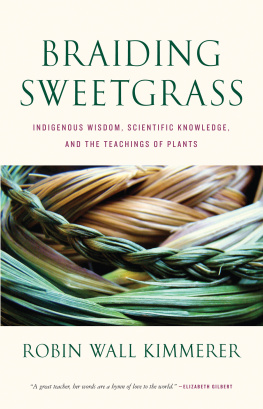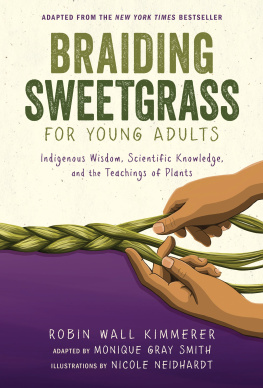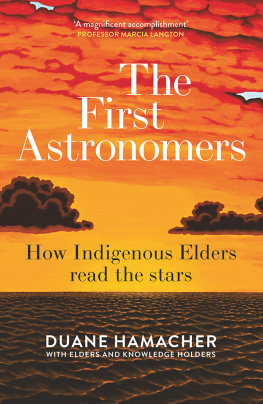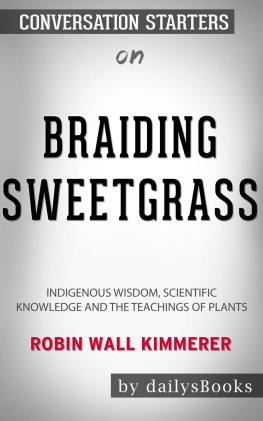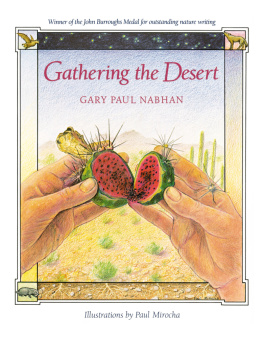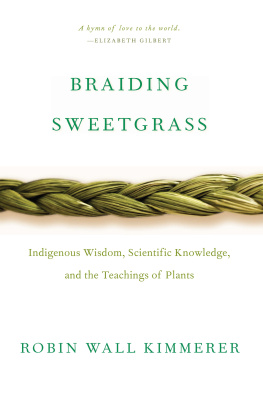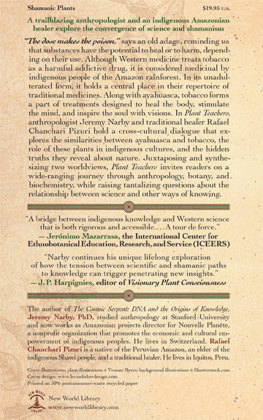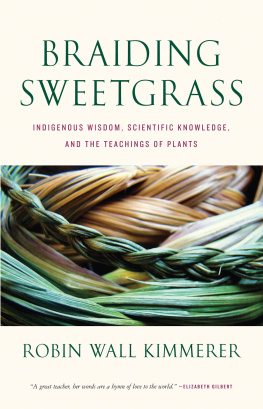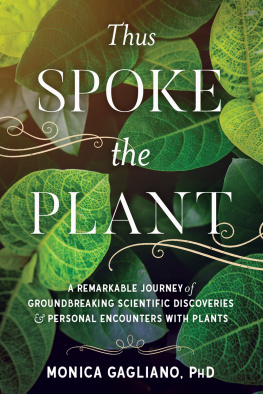BRAIDING SWEETGRASS
Also by Robin Wall Kimmerer
Gathering Moss
BRAIDING SWEETGRASS
Robin Wall Kimmerer
2013, Text by Robin Wall Kimmerer
All rights reserved. Except for brief quotations in critical articles or reviews, no part of this book may be reproduced in any manner without prior written permission from the publisher: Milkweed Editions, 1011 Washington Avenue South, Suite 300, Minneapolis, Minnesota 55415.
(800) 520-6455
www.milkweed.org
Published 2013 by Milkweed Editions
Printed in Canada
Cover design by Gretchen Achilles / Wavetrap Design
Cover photo Teresa Carey
Author photo by Dale Kakkak
13 14 15 16 17 5 4 3 2 1
First Edition
Milkweed Editions, an independent nonprofit publisher, gratefully acknowledges sustaining support from the Bush Foundation; the Patrick and Aimee Butler Foundation; the Dougherty Family Foundation; the Driscoll Foundation; the Jerome Foundation; the Lindquist & Vennum Foundation; the McKnight Foundation; the voters of Minnesota through a Minnesota State Arts Board Operating Support grant, thanks to a legislative appropriation from the arts and cultural heritage fund, and a grant from the Wells Fargo Foundation Minnesota; the National Endowment for the Arts; the Target Foundation; and other generous contributions from foundations, corporations, and individuals. For a full listing of Milkweed Editions supporters, please visit www.milkweed.org.
Library of Congress Cataloging-in-Publication Data
Kimmerer, Robin Wall.
Braiding sweetgrass : indigenous wisdom, scientific knowledge and the teachings of plants / Robin Wall Kimmerer. First edition.
pages cm
Summary: As a leading researcher in the field of biology, Robin Wall Kimmerer understands the delicate state of our world. But as an active member of the Potawatomi nation, she senses and relates to the world through a way of knowing far older than any science. In Braiding Sweetgrass, she intertwines these two modes of awarenessthe analytic and the emotional, the scientific and the culturalto ultimately reveal a path toward healing the rift that grows between people and nature. The woven essays that construct this book bring people back into conversation with all that is green and growing; a universe that never stopped speaking to us, even when we forgot how to listenProvided by publisher.
ISBN 978-1-57131-335-5 (hardback : alkaline paper)
1. Indian philosophy. 2. Indigenous peoplesEcology. 3. Philosophy of nature.
4. Human ecologyPhilosophy. 5. NatureEffect of human beings on. 6. Human-plant relationships. 7. BotanyPhilosophy. 8. Kimmerer, Robin Wall. 9. Potawatomi IndiansBiography. 10. Potawatomi IndiansSocial life and customs. I. Title.
E98.P5K56 2013
305.597dc23
2013012563
Milkweed Editions is committed to ecological stewardship. We strive to align our book production practices with this principle, and to reduce the impact of our operations in the environment. We are a member of the Green Press Initiative, a nonprofit coalition of publishers, manufacturers, and authors working to protect the worlds endangered forests and conserve natural resources. Braiding Sweetgrass was printed on acid-free 100 % postconsumer-waste paper by Friesens Corporation.
For all the Keepers of the Fire
my parents
my daughters
and my grandchildren
yet to join us in this beautiful place
CONTENTS
Preface
PLANTING SWEETGRASS
Skywoman Falling
The Council of Pecans
The Gift of Strawberries
An Offering
Asters and Goldenrod
Learning the Grammar of Animacy
TENDING SWEETGRASS
Maple Sugar Moon
Witch Hazel
A Mothers Work
The Consolation of Water Lilies
Allegiance to Gratitude
PICKING SWEETGRASS
Epiphany in the Beans
The Three Sisters
Wisgaak Gok penagen: A Black Ash Basket
Mishkos Kenomagwen: The Teachings of Grass
Maple Nation: A Citizenship Guide
The Honorable Harvest
BRAIDING SWEETGRASS
In the Footsteps of Nanabozho: Becoming Indigenous to Place
The Sound of Silverbells
Sitting in a Circle
Burning Cascade Head
Putting Down Roots
Umbilicaria: The Belly Button of the World
Old-Growth Children
Witness to the Rain
BURNING SWEETGRASS
Windigo Footprints
The Sacred and the Superfund
People of Corn, People of Light
Collateral Damage
Shkitagen: People of the Seventh Fire
Defeating Windigo
Epilogue: Returning the Gift
Notes
Sources
Acknowledgments
PREFACE
Hold out your hands and let me lay upon them a sheaf of freshly picked sweetgrass, loose and flowing, like newly washed hair. Golden green and glossy above, the stems are banded with purple and white where they meet the ground. Hold the bundle up to your nose. Find the fragrance of honeyed vanilla over the scent of river water and black earth and you understand its scientific name: Hierochloe odorata, meaning the fragrant, holy grass. In our language it is called wiingaashk, the sweet-smelling hair of Mother Earth. Breathe it in and you start to remember things you didnt know youd forgotten.
A sheaf of sweetgrass, bound at the end and divided into thirds, is ready to braid. In braiding sweetgrassso that it is smooth, glossy, and worthy of the gifta certain amount of tension is needed. As any little girl with tight braids will tell you, you have to pull a bit. Of course you can do it yourselfby tying one end to a chair, or by holding it in your teeth and braiding backward away from yourselfbut the sweetest way is to have someone else hold the end so that you pull gently against each other, all the while leaning in, head to head, chatting and laughing, watching each others hands, one holding steady while the other shifts the slim bundles over one another, each in its turn. Linked by sweetgrass, there is reciprocity between you, linked by sweetgrass, the holder as vital as the braider. The braid becomes finer and thinner as you near the end, until youre braiding individual blades of grass, and then you tie it off.
Will you hold the end of the bundle while I braid? Hands joined by grass, can we bend our heads together and make a braid to honor the earth? And then Ill hold it for you, while you braid, too.
I could hand you a braid of sweetgrass, as thick and shining as the plait that hung down my grandmothers back. But it is not mine to give, nor yours to take. Wiingaashk belongs to herself. So I offer, in its place, a braid of stories meant to heal our relationship with the world. This braid is woven from three strands: indigenous ways of knowing, scientific knowledge, and the story of an Anishinabekwe scientist trying to bring them together in service to what matters most. It is an intertwining of science, spirit, and storyold stories and new ones that can be medicine for our broken relationship with earth, a pharmacopoeia of healing stories that allow us to imagine a different relationship, in which people and land are good medicine for each other.
BRAIDING SWEETGRASS
PLANTING SWEETGRASS
Sweetgrass is best planted not by seed, but by putting roots directly in the ground. Thus the plant is passed from hand to earth to hand across years and generations. Its favored habitat is sunny, well-watered meadows. It thrives along disturbed edges.
Skywoman Falling
In winter, when the green earth lies resting beneath a blanket of snow, this is the time for storytelling. The storytellers begin by calling upon those who came before who passed the stories down to us, for we are only messengers.
In the beginning there was the Skyworld.
Next page
